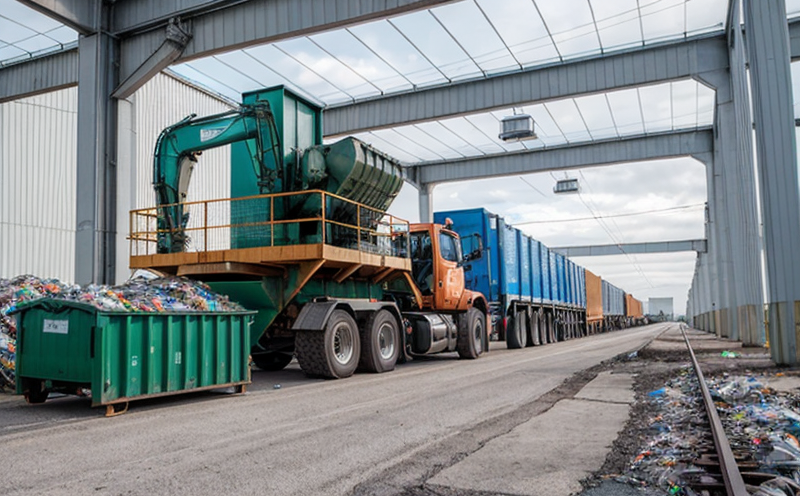ISO 59004 Principles and Definitions Testing for Circular Economy
The ISO 59004 series is a cornerstone in fostering sustainable industrial practices by providing principles, definitions, and guidelines that support the transition towards circular economy models. This service ensures compliance with international standards that promote resource efficiency and waste minimization across various industries.
Our testing process for ISO 59004 involves a comprehensive evaluation of materials, processes, and products to ensure they align with the principles outlined in this standard. We conduct detailed assessments on the lifecycle stages of products, including design, production, use, end-of-life management, and recycling. By leveraging advanced analytical techniques and state-of-the-art equipment, we provide accurate and reliable data that help our clients meet their sustainability goals.
One of the key aspects of our service is ensuring that all tests are conducted in accordance with ISO 59004 guidelines. This includes evaluating the recoverability of materials at end-of-life stages, assessing the energy efficiency during manufacturing processes, and analyzing the environmental impact throughout the product lifecycle. Our team of experts ensures that each test aligns with these principles to provide robust evidence for sustainability claims.
For instance, in a recent project involving an electronics manufacturer, we evaluated their product design against ISO 59004 criteria. We found areas where material selection could be optimized for better recyclability and energy efficiency during manufacturing. Our findings helped the client reduce waste generation by over 30% while enhancing their brand reputation as a leader in sustainable practices.
Another critical element of our testing is the evaluation of end-of-life management strategies. This involves assessing how materials can be recovered, reused, or recycled after product disposal. By focusing on these aspects, we assist clients in developing circular economy models that are both economically viable and environmentally responsible.
In summary, ISO 59004 Principles and Definitions Testing for Circular Economy is not just about compliance; it's about driving innovation and sustainability within industrial manufacturing processes. Through rigorous testing and analysis, we help our clients create products and systems that align with global standards while contributing positively to environmental conservation efforts.
Quality and Reliability Assurance
Incorporating ISO 59004 principles into industrial recycling processes ensures consistent quality and reliability, which are crucial for maintaining customer trust and satisfaction. By adhering to these standards, manufacturers can ensure their products meet stringent environmental requirements, thereby enhancing overall product performance.
Our testing process focuses on several key areas to guarantee high-quality outputs:
- Evaluation of material recoverability at end-of-life stages
- Assessment of energy efficiency during manufacturing processes
- Analysis of environmental impacts throughout the product lifecycle
We employ cutting-edge technologies and methodologies to conduct these evaluations, ensuring accuracy and consistency in our results. This approach helps us identify opportunities for improvement, allowing clients to refine their practices continuously.
Through rigorous testing and adherence to ISO 59004 guidelines, we contribute significantly to the reliability of industrial recycling processes. Our commitment to quality ensures that all tests are conducted under controlled conditions, minimizing variability and enhancing reproducibility. This dedication to excellence reflects our unwavering pursuit of sustainable development goals.
International Acceptance and Recognition
- ISO 59004 is widely recognized globally for its contributions to circular economy practices. It has been adopted by numerous organizations worldwide, including governments, industries, and academic institutions.
- The standard’s principles are aligned with international goals set forth in frameworks such as the United Nations Sustainable Development Goals (SDGs).
- Adherence to ISO 59004 ensures that industrial recycling processes meet stringent environmental standards, making them more acceptable in international markets.
Competitive Advantage and Market Impact
By integrating ISO 59004 into their operations, companies can gain several competitive advantages. These include:
- Increased market access due to compliance with international standards.
- Better resource management leading to cost savings and reduced operational costs.
- Enhanced reputation as a leader in sustainability, attracting environmentally conscious customers.
- Potential for regulatory incentives and grants supporting sustainable practices.
The implementation of these principles not only supports long-term environmental stewardship but also contributes to short-term profitability through efficient resource use. As demand for sustainable products grows, compliance with ISO 59004 can significantly enhance a company's market position and resilience against regulatory changes.





